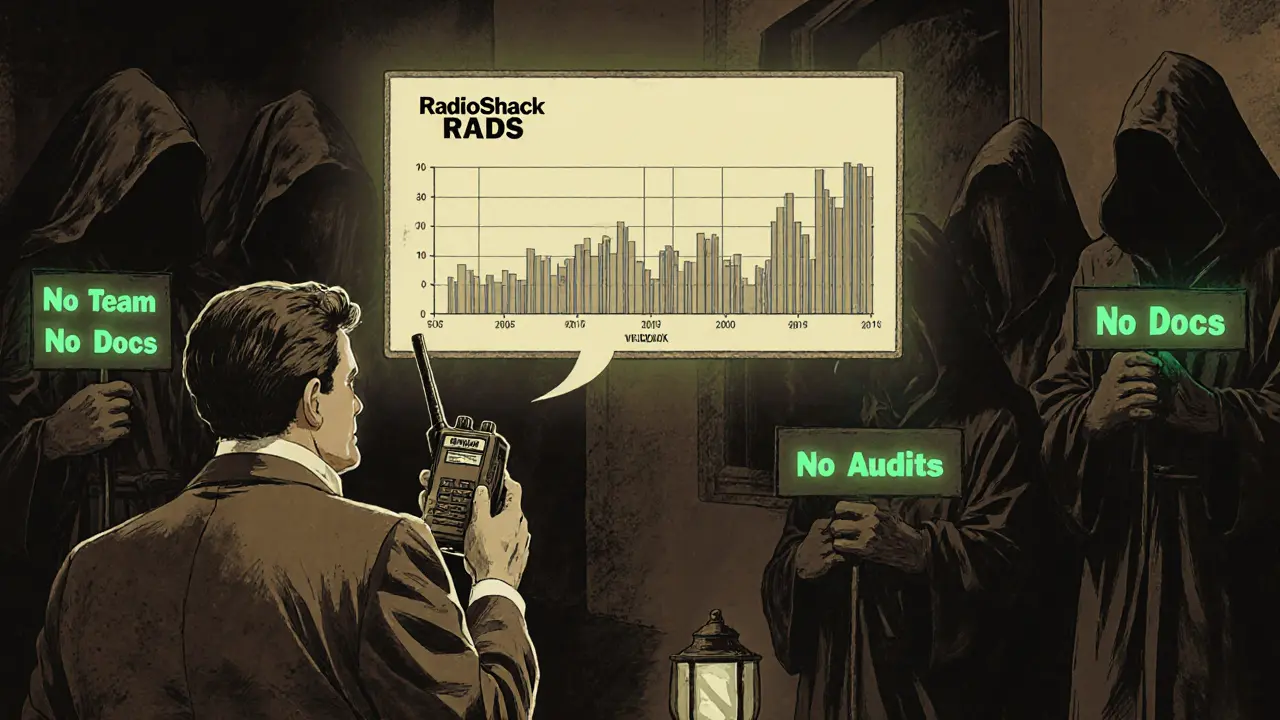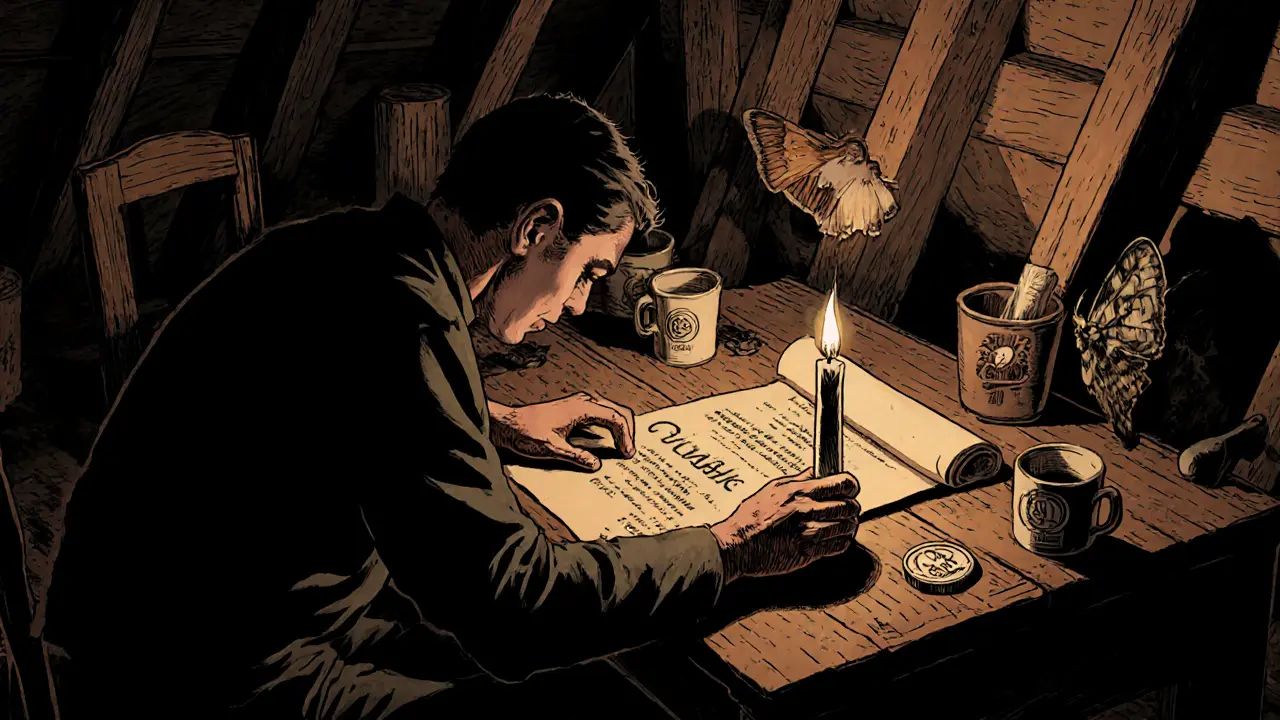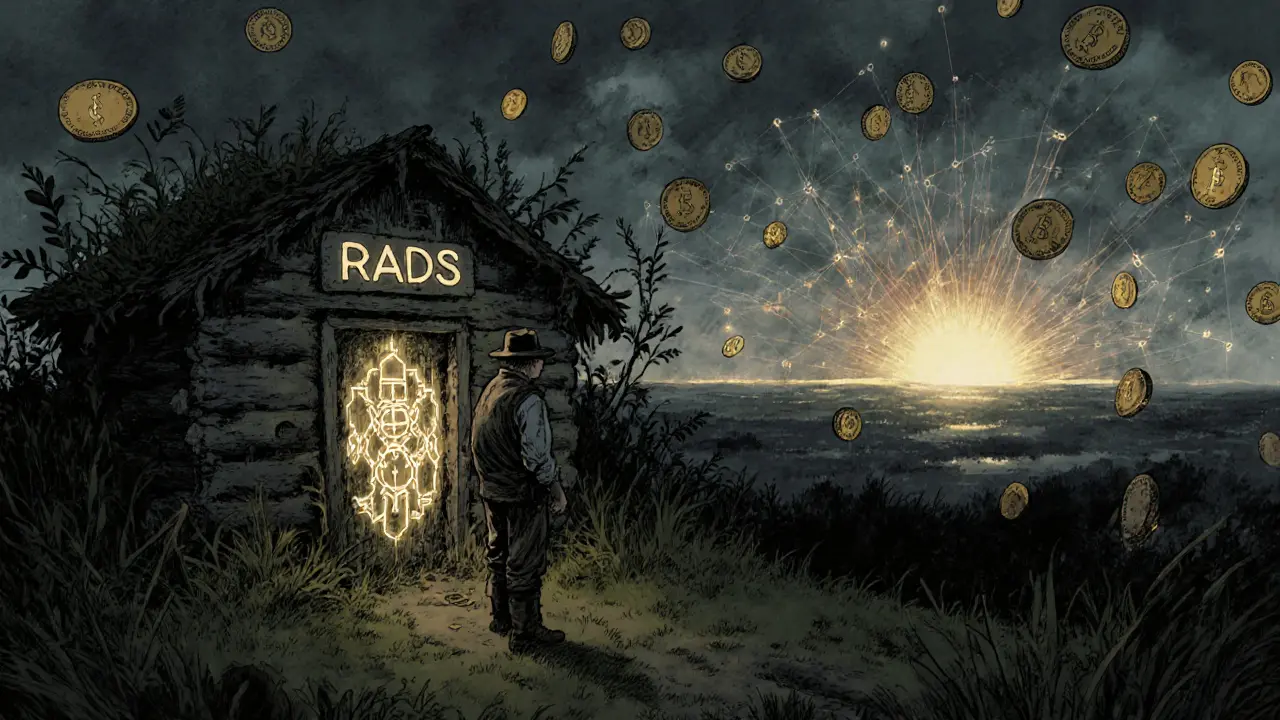Token Risk Assessment Tool
This tool helps you assess the risk level of a crypto token by evaluating its transparency, liquidity, and development status. Based on your answers, you'll receive a risk score and detailed explanation of what the score means for investment safety.
Token Risk Assessment Questions
Answer these questions to evaluate a token's risk level.
There’s no such thing as a RadioShack crypto exchange. If you’re searching for one, you’ve been misled. RadioShack (RADS) isn’t a platform where you buy or trade crypto like Binance or Coinbase. It’s a token built on the Celo blockchain - a small, obscure piece of a much bigger DeFi puzzle. Most people who look up "RadioShack crypto" think they’re finding a new exchange. They’re not. They’re stumbling into a niche liquidity protocol with almost no public documentation, no user reviews, and no clear team behind it.
What RadioShack (RADS) Actually Is
RADS is a token on the Celo network. It doesn’t run its own exchange. Instead, it’s designed to improve how tokens swap within decentralized finance (DeFi). The official goal? Reduce the "diameter of the graph of swappable tokens." That’s tech-speak for making trades faster by cutting down the number of steps between two tokens. Think of it like routing a package: instead of going through five warehouses to get from New York to LA, RADS tries to find a direct route.
This isn’t a new idea. Projects like 1inch and Matcha already do this on Ethereum. But RADS is trying to do it on Celo - a blockchain built for mobile users, with lower fees and faster confirmation times. Celo has over 500,000 daily active users and handles $1.7 billion in monthly stablecoin volume as of October 2025. RADS rides on that infrastructure. But unlike Uniswap or PancakeSwap, which have millions in trading volume and detailed docs, RADS has almost nothing online.
Why People Get Confused
The name "RadioShack" is the problem. It’s a brand people remember from the 90s - the store where you bought batteries, headphones, and walkie-talkies. When you see "RadioShack crypto," your brain assumes it’s a company launching a new exchange. It’s not. There’s no connection to the old electronics retailer. The project likely chose the name for nostalgia or shock value, but it’s causing constant confusion.
Search engines amplify this. If you type "RadioShack crypto exchange," Google shows you CoinMarketCap listings for RADS and links to Celo-related forums. But nowhere does it say: "This is not an exchange." You have to dig deep to find out RADS is just a token with a technical function. Most users never make it that far.
How It Works (If You Can Even Use It)
Technically, RADS operates as a smart contract on Celo. That means you need a wallet that supports the Celo network - like MetaMask with Celo added as a custom RPC, or the Celo Wallet app. You’d need CELO tokens to pay for gas, and then you’d interact with RADS’s liquidity pools through a DeFi interface like CeloSwap or SushiSwap on Celo.
But here’s the catch: there’s no official website. No whitepaper. No GitHub repo. No Twitter account with updates. No Discord server with active devs. You can find RADS on CoinMarketCap, but the page is bare: market cap under $5 million, trading volume under $200,000 daily, and no liquidity pool details. That’s not a sign of growth. That’s a sign of neglect.
Compare that to Uniswap. You can read their entire roadmap, see their team’s names, check their code on GitHub, and watch live analytics. RADS? Nothing. If you’re thinking of investing, you’re going in blind.

Is It Safe?
There’s no record of RADS being hacked. But that’s because it’s too small to be a target. Security experts don’t monitor it. The Celo team issued a general warning in October 2025 about smart contract risks and urged users to use hardware wallets - but they didn’t mention RADS once. That tells you everything.
Without audits, without transparency, without community feedback - there’s no way to know if the code is clean. One bug in the smart contract, and your RADS tokens could vanish overnight. And because it’s not listed on major exchanges, you can’t easily sell if things go wrong. You’re stuck holding a token with no real demand.
Who’s Behind It?
No one knows. No founding team is listed. No investors are named. No press releases exist. Even CoinBureau, which reviews every new crypto project, doesn’t mention RADS. That’s not normal. Legit projects get covered. Even obscure ones get a tweet from a crypto influencer. RADS? Silence.
Some speculate it’s a side project by a single developer. Others think it’s a pump-and-dump scheme disguised as DeFi innovation. The lack of information makes both theories possible. But in crypto, silence isn’t neutrality - it’s risk.
What’s the Point?
If RADS had traction, it might be worth exploring. But right now, it serves no practical purpose for most people. You won’t use it to trade Bitcoin. You won’t use it to send money to family overseas. You won’t earn yield on it through any major DeFi platform. The only way to interact with RADS is to buy it, hope it goes up, and pray someone else buys it later.
That’s gambling, not investing. And in a market where even Bitcoin has clear use cases, RADS has none. It’s a solution to a problem no one’s asking about, built on a blockchain that’s still fighting for mainstream adoption.

Where It Stands in October 2025
Celo is growing. The network is processing $445 million in 24-hour trading volume. It’s adding new features like Nightfall Layer 3 for private transactions. It’s targeting the $180 trillion B2B payments market. But RADS? It’s barely a footnote.
Its market cap hovers around $4.8 million. Daily volume? Less than $180,000. That’s 0.04% of Celo’s total trading activity. If you removed RADS from the ecosystem tomorrow, no one would notice. It’s not contributing to liquidity. It’s not driving adoption. It’s not even being discussed.
Should You Buy RADS?
No - unless you’re comfortable losing your entire investment.
There’s no fundamental reason to hold RADS. No utility. No team. No roadmap. No community. Even if Celo’s price goes to $2.86 by 2029 (as some predict), RADS won’t ride that wave. It doesn’t have the infrastructure to benefit from it.
If you’re looking to get into Celo-based DeFi, go for established protocols: CeloSwap, Valora, or even the native CELO token. They’re transparent. They’re audited. They have users. RADS? It’s a ghost.
Final Thoughts
RadioShack (RADS) isn’t a crypto exchange. It’s not even a meaningful project. It’s a token with a catchy name, zero documentation, and no future. If you’re reading this because you saw an ad or a YouTube video pushing RADS as the "next big thing," walk away. You’re being sold a fantasy.
The real crypto innovation is happening in places you can see, verify, and trust. Don’t waste your time on shadows.
Is RadioShack (RADS) a real crypto exchange?
No, RadioShack (RADS) is not an exchange. It’s a token on the Celo blockchain designed to optimize token swaps in DeFi. You can’t buy or sell crypto directly on RadioShack - it has no user interface, no wallet, and no trading platform.
Can I trade RADS on Binance or Coinbase?
No, RADS is not listed on any major centralized exchanges like Binance, Coinbase, or Kraken. It’s only available on a few small decentralized exchanges (DEXs) on the Celo network, and even there, liquidity is extremely low.
Is RADS a good investment?
Based on available data, RADS is not a good investment. It has no team, no documentation, no audits, and almost no trading volume. The project shows no signs of development or community support. Investing in RADS is pure speculation with high risk of total loss.
Why does RADS have the name RadioShack?
There’s no official explanation. The name appears to be chosen for brand recognition or irony, as it has no connection to the original RadioShack electronics retailer. It’s a marketing tactic that causes confusion and misleads people into thinking it’s a legitimate company-backed project.
How do I buy RADS tokens?
You can only buy RADS on decentralized exchanges on the Celo network, like CeloSwap or SushiSwap on Celo. You’ll need a Celo-compatible wallet (like MetaMask with Celo added), CELO tokens for gas, and the ability to find the RADS token address manually - since it’s not listed in standard wallet interfaces.
Is RADS safe to use?
There’s no evidence RADS has been hacked, but it’s also not audited or monitored. Without public code, team info, or security reviews, it’s impossible to verify safety. Using RADS means trusting anonymous code - a high-risk move in crypto.
Does RADS have a roadmap or future plans?
No. There are no published roadmaps, GitHub updates, or team announcements. The project appears abandoned or inactive. Any claims about future features are speculative and unsupported by facts.
Why isn’t RADS covered by major crypto news sites?
Major outlets like CoinBureau, CoinDesk, and Cointelegraph don’t cover RADS because it lacks substance. There’s no team, no innovation, no traction. Crypto media covers projects with real development - RADS has none.

Roxanne Maxwell
October 27, 2025 AT 22:26Man, I just found out about this RADS thing and my first thought was "Wait, did RadioShack come back as a crypto company?" I mean, I still have my old walkie-talkie from 2003. It's kinda sweet they're using the name, even if it's misleading. Hope someone builds something real with it someday.
Jonathan Tanguay
October 28, 2025 AT 18:15Oh wow another clueless crypto noob falling for the nostalgia bait. RadioShack was a dying brand long before crypto existed. This RADS token is a dumpster fire wrapped in a meme. The Celo chain has real utility with mobile payments and stablecoin adoption but some idiot slaps "RadioShack" on a smart contract and suddenly it's a "project"? The devs probably just scraped together a token contract and called it a day. No docs no team no audits no future. Just a vanity project with a 90s brand name because they thought it'd go viral. And now you people are actually considering buying it? Bro you're not investing you're just feeding the algorithm. This isn't DeFi this is crypto theater with a side of cringe.
Elliott Algarin
October 29, 2025 AT 09:09It's funny how we attach meaning to names. RadioShack used to mean fixing your electronics with a soldering iron and a bag of resistors. Now it's just a ghost in a blockchain contract. Maybe the name was chosen to remind us how much we've lost - real hardware, real repair, real community. Now we just trade tokens nobody understands on chains nobody can explain. The real tragedy isn't RADS. It's that we don't even notice when something meaningful gets replaced by a symbol.
Akinyemi Akindele Winner
October 30, 2025 AT 06:07Yo this RADS thing is just a crypto ghost story with a side of corporate nostalgia. They didn't name it RadioShack because it's cool - they named it that because they knew people would Google it and fall for the trap. It's like putting a McDonald's sign on a dumpster and calling it gourmet. The devs are probably high on cheap energy drinks in a basement in Manila or Lagos. Meanwhile the Celo network is doing real work and this RADS thing is just a parasite clinging to its legs like a tick. Let it rot. Don't feed the void.
Serena Dean
October 30, 2025 AT 10:49If you're new to crypto and stumbled on RADS - don't panic. Just walk away. There's zero reason to touch this. If you want to explore Celo, try CeloSwap or Valora. They have docs, teams, and actual users. RADS? It's like buying a car with no engine and hoping it magically starts. You're not investing - you're gambling with your peace of mind. Stick to the projects that show up on CoinGecko with more than three lines of info. You'll thank yourself later.
Chloe Jobson
October 31, 2025 AT 02:05Agreed. RADS is a perfect example of why due diligence matters. The name alone should raise red flags - no reputable project would use a defunct retail brand without disclosure. And the fact that it's not on any major CEX? That’s not a feature, it’s a warning. Even if the tech worked (which it doesn’t seem to), the opacity makes it toxic. Stick to audited, transparent protocols. Your portfolio will thank you.
James Young
November 1, 2025 AT 07:30You guys are being too nice. This isn't just a bad project - it's a scam waiting to happen. Someone created this token, dumped it on a DEX, and left. No GitHub, no Twitter, no Discord, no whitepaper - not even a Telegram group. That's not negligence. That's intentional obfuscation. If you're buying RADS, you're not just risking money - you're funding anonymous fraud. And the fact that CoinMarketCap even lists it without a single warning? That's the real scandal. Regulators should shut this down before someone loses their rent money.
Zach Crandall
November 1, 2025 AT 20:05As someone who lived through the dot-com bubble and watched every fad come and go, I can say with certainty: this is not innovation. It is performative obscurity dressed in the clothing of DeFi. The Celo blockchain is a legitimate platform with real-world use cases. RADS is a linguistic trap, a semantic ghost haunting the digital marketplace. To invest in this is to surrender your agency to the algorithmic whims of a name that no longer means anything. It is not a token. It is a monument to collective delusion.
Ali Korkor
November 3, 2025 AT 00:25Hey if you're curious about RADS - just skip it. Seriously. There's zero reason to touch it. Go learn about CELO or CeloSwap instead. They're real. They have teams. They update. RADS? It's like finding a dusty old VCR in your attic and thinking it's the next Netflix. Just walk away. Your future self will high-five you.
Dick Lane
November 4, 2025 AT 10:00I read this whole thing and I just feel sad. Not angry. Sad. Because I remember when RadioShack was a place where you could ask someone how to fix your radio and they'd actually help. Now we're trading tokens with no names behind them. The real loss isn't money. It's trust.
Ayanda Ndoni
November 5, 2025 AT 09:46Bro I just bought 500 RADS because I saw a guy on TikTok say it'll hit $100. I'm rich now right? 😎
Sean Huang
November 6, 2025 AT 03:02They're using RadioShack because the government planted the name to distract us from the real crypto projects being suppressed. The Celo network is a front for global surveillance. RADS is a honeypot. They want you to buy it so they can track your wallet and link it to your social credit score. That's why there's no team - because the team is the NSA. Don't touch it. Burn your wallet. Delete your browser history. They're watching.
John Murphy
November 7, 2025 AT 21:53I checked the token address and the contract code is just a basic ERC-20 with a name change. No liquidity locks. No renounced ownership. The dev could pull the plug tomorrow and no one could stop them. This isn't DeFi. It's a digital slot machine with a retro logo.
Patrick De Leon
November 8, 2025 AT 10:56The fact that anyone still engages with this is proof of the intellectual decay of the crypto community. RADS is not a project. It is a linguistic virus. It infects search results. It confuses beginners. It pollutes the discourse. The Celo ecosystem deserves better. And yet we let this garbage linger because we are too lazy to fact-check. Shame.
madhu belavadi
November 9, 2025 AT 09:43Why are we even talking about this? I don't care. I'm just here to scroll.
Norman Woo
November 10, 2025 AT 17:50Wait so RADS is like... the crypto version of those old RadioShack clearance bins? You know the ones? All the broken walkie-talkies and dead batteries nobody wanted? Yeah that's what this feels like. Just a pile of forgotten junk with a fancy blockchain label. I'm not buying it. I'm not even clicking the link. I'm just gonna go drink coffee and forget this ever existed.
Michael Folorunsho
November 11, 2025 AT 19:54Let me be blunt: if you're reading this and thinking about buying RADS, you're not a crypto investor - you're a data point. You're the reason these scams exist. You're the reason developers don't need to build real products. You're the reason the market is a circus. Stop being the punchline. Walk away. Now.
MANGESH NEEL
November 13, 2025 AT 19:19People keep saying "don't invest" but they never say why they're still here. If RADS is so worthless why are you even reading this post? Why are you scrolling? Why are you commenting? You're not warning people - you're feeding the algorithm. You're the ghost haunting your own warnings. This whole thread is a performance. We're all just actors in someone else's pump-and-dump play. And the saddest part? We know it. And we still click.